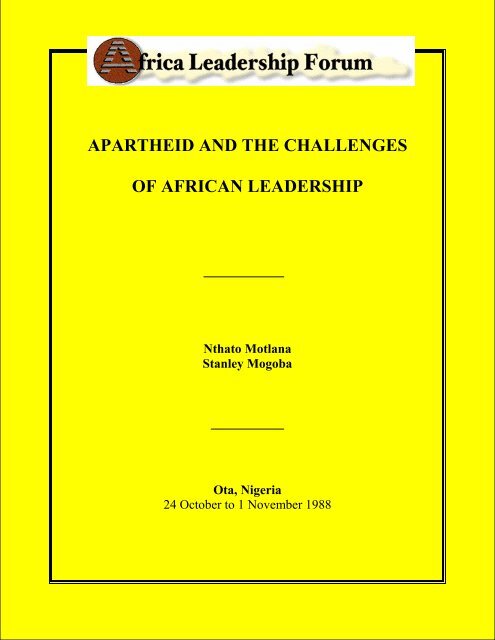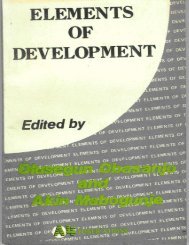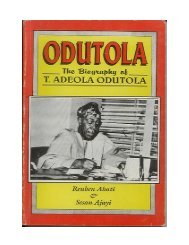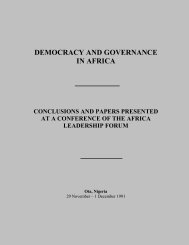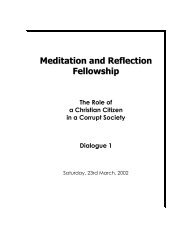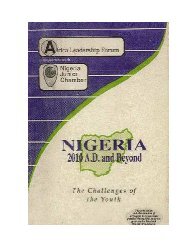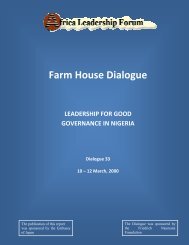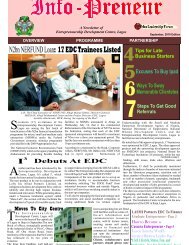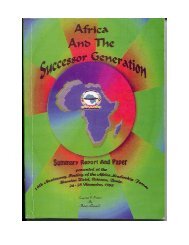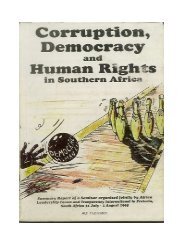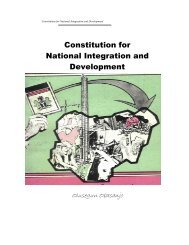APARTHEID AND THE CHALLENGES OF AFRICAN LEADERSHIP
APARTHEID AND THE CHALLENGES OF AFRICAN LEADERSHIP
APARTHEID AND THE CHALLENGES OF AFRICAN LEADERSHIP
Create successful ePaper yourself
Turn your PDF publications into a flip-book with our unique Google optimized e-Paper software.
<strong>APAR<strong>THE</strong>ID</strong> <strong>AND</strong> <strong>THE</strong> <strong>CHALLENGES</strong><strong>OF</strong> <strong>AFRICAN</strong> <strong>LEADERSHIP</strong>Nthato MotlanaStanley MogobaOta, Nigeria24 October to 1 November 1988
<strong>APAR<strong>THE</strong>ID</strong> <strong>AND</strong> <strong>THE</strong> <strong>CHALLENGES</strong><strong>OF</strong> <strong>AFRICAN</strong> <strong>LEADERSHIP</strong>Nthato MotlanaStanley MogobaDiscussions of the Inaugural Programme of theAfrica Leadership ForumOta, Nigeria24 October to 1 November 1988
Table of ContentsPage1. Apartheid and Leadershipby Dr. Nthato Motlana 12. Forum Discussion 73. Apartheid and the Challenges of AfricanLeadership 10By Rev. Stanley Mogoba4. Forum Discussion 165. List of Participants 206. Background Note: The Africa Leadership 23Forum
Apartheid and LeadershipByNthato MotlanaThe struggle for recognition of legitimate leadership in South Africa pre-dates apartheidas enshrined by the Nationalists. It was with the coming of the Nationalists that thecornerstones of apartheid were developed in an attempt to ensure the subjugation of theblack majority by denying it basic human and civil rights.Prior to 1948, the leadership struggle was not dissimilar to that being waged in otherAfrican countries – it was an issue of colonialisation and of outsiders being leaders of theSouth African people. The white settlers in South Africa were, by and large, no differentfrom white settlers anywhere else, and in fact used the same methods to assertthemselves. Even after they had ensconced themselves as the governors of South Africa,they did not manage to quell the true leader of the black people, beginning a dichotomybetween leadership and government that today still characterizes South Africa. Thehistory of South Africa, even before 1948, is thus a history of the clash between theimposed government and the true leaders of the people, and of the measures whichsuccessive governments used in an attempt to crush that leadership, destroy its powerbase, and subjugate the people. It is also a history of resistance on the behalf of blackSouth Africans – a history of resilience, suffering and determination to achieve liberation.In his seminar book “The Puritans in Africa”, M.W. de Klerk discusses the strangephenomenon of the 1952 Dutch who settled in South Africa at about the same time thatthe “Pilgrim Fathers” peopled the United States – stubborn people who created a legallystratified society that has persisted up to this day.The unsophisticated Afrikaners of the 17 th century had no idea how to deal with theleaders of Colonial Africa. The relationships were characterized by a naïve, disingenuous,patronizing, always brutal attitude. Blacks need only recall their dealings with Dingaan –the Zulu king-and the killing of the Voortrekkier Piet Relief.As in so many things of this world, we owe it to the suave, sophisticated British – who inmany years of ruling half of mankind had developed special skills in controlling the“natives”.As in many other parts of the world, Britain practised what came to be known as IndirectRule. The tribal kings/chiefs or elders were left in place, merely changing into full-time,paid civil servants – to carry out the wishes of their masters. Didn’t Andrew Young sayBritain had invented racism?It is a policy that apartheid South Africa has embraced. Thus, we have the caricature ofignorant, often illiterate chiefs shored up, dressed up like a Gilbert and Sullivan Major-General in imitation gold braid parade on national television as the authentic blackleaders.1
In 1948, the Nationalist Party came to power, and with it the system of apartheid – thegrand design to ensure the subjugation of blacks and the supremacy of whites by placingtotal power in the hands of a minority white government. Apartheid codified the systemof repression and set out to destroy the power base of existing black leaders and preventnew leaders from coming to power. It has failed miserably. Rather than prevent theemergence of new leaders of the people, apartheid has engendered leadership assuccessive generations have rejected repression and been willing to fight for freedom andhuman rights.It is this constant emergence of leaders and the State repression of them that I wish toconcentrate on. I simply want to indicate some key events and the response to them so asto show the breadth and depth of South African leadership in the years since 1948.The South African government has always been threatened by the true leaders of theblack people, which is why it has always responded to them with brutality. Once its granddesign of reducing all blacks to subservience had failed, it attempted to create its own“leaders” – people who it co-opted to try to take power from the true leaders of thepeople. Hence there arose a complicated network of regional and local structures thatattempted to pass themselves as the legitimate governmental entities of the black people.In the case of Transkei, Ciskei, Venda and Bophuthatswana, the government went to theextreme by invoking “independence” for entities that were neither credible, legitimate nordid they enjoy popular backing. Just last week the government engaged in another futileexercise under the guise of municipal elections, which could claim only a minisculefraction of the black people’s support.Indeed, all efforts at mass co-option have uniformly failed. Generations of true leadershave been imprisoned, killed, forced into exile and yet the South African government hasnot destroyed the leadership of black South Africans, and it still has not achieved controlthrough subjugation. Oppression has not clouded our vision.To suggest why this has not happened is to indicate a salient feature of black SouthAfrican leadership. It is essentially community-based. Black South Africans are first andforemost community leaders. They are not appointed. It is for this reason that the SouthAfrican government has not managed to erode the true leadership of the black people,and also why it has not managed to instigate a system of government that is effective.The South African government is threatened by leadership at all levels, from the nationalheroes like Mandela and Sisulu to the grassroots leaders who are involved in organizing,at the local level, to empower communities to exercise an element of control over theirown existence. This leadership threatens it because it represents the resilience of theblack South Africans to resist the apartheid regime and to define its own destiny.After the Boers and the British had fought over the gold and diamonds and the encrustedsouthern land which is my country, the Union of South Africa came into being in 1910. Aconstitution was drawn up in collaboration with, and the concurrence of, the then liberalgovernment of Great Britain. Two generals at the peace convention in 1910, namelyLouis Botha – a distant grandfather of P.W. Botha – and the well known Field Marshal ofthe British Empire, John Smuts, threatened to walk out of that conference if Britain2
In the 1950s, the ANC mounted many campaigns and other forms of protest includingboycotts and strikes, to which the government responded almost routinely with raids onthe black townships in which many people died. In one such protest during the1950 MayDay protest, which the government saw as a change in opposition and consequently putdown with the violent death of 18 people.The 1950s saw the growth of campaigns to oppose the government, particularly theDefiance Campaign, and also the growth of government repression as leaders werebanned and legislation introduced to cut off channels of opposition – Criminal LawAmendment Act – and the treason trial of 1956 foreshadowing things to come. Othergroups were formed – Unity Movement, Pan-Africanist Congress of Azania (PAC), andother organizations such as TIC and NIC were involved. In 1959 PAC broke away fromANC.In 1960, a new wave of oppression occurred in response to anti-apartheid demonstrationsorganized by the ANC and PAC. The South African government declared a state ofemergency, passed the Unlawful Organizations’ Act and banned both the ANC and PAC.All these actions foreshadowed things to come and indicated the response by the state tolawful opposition – the attempt to crush, oppress and repress.The Sharpeville Massacre chillingly portrayed the readiness of the state to use violence tocounter and crush opposition, a willingness that has been seen time and time again sincethen.During the 1960s, the repression and oppression continued. The ANC and PAC wereforced into exile, together with many leaders even as the Rivonia trial ended with theimprisonment of leaders such as Mandela and Sisulu. Other measures include the banningand listing of individuals. A peculiarly South African phenomenon, if you are listed itmeans your name is put on a list kept by the State Attorney -General; you may then neveragain be quoted in any newspaper, radio or television; you may never again enter anyinstitution of learning – schools or university – and you may never publish; in otherwords you die a civil death. All these were in addition to increasing imprisonment ofopposition leaders and organizers for long periods.The 1970s saw the growth of the black consciousness movement, with outstandingleaders such as Steve Biko; the era of SASO, BPC, the FRELIMO rallies, SASM, trialsof black consciousness leaders, SSRC and several unrest. The State’s response to allthese was again violence, mass arrests, increasing repression and a massive clampdownon community based organizations, more banning and arrests.The 1980s saw the emergence of AZAPO and the United Democratic Front and with itincreased government oppression, political trials, and more legislation curtailing theopposition, more violence and imprisonment of leaders. A state of emergency wasimposed and re-imposed – the most recent one in June 1986, which was suspended after ayear and then re- imposed because the State thought it could not control internal dissentwithout this tool. We are confronted by mass detentions without trial, detention ofminors, torture, increasing clampdown on community organizations and trade unions,4
estrictions on the press coupled with ever much stronger attempts to create structuresand to co-opt “leaders” – all of which have failed.The situation we face in 1988 is one of increased oppression as the gap betweengovernment and the leadership widens. The South African government becomesincreasingly aware that it has failed to impose an unjust system on the black majority. Ishould not say black majority, I should say an injustice on the people of South Africabecause one thing that the United Democratic Front demonstrated when it was launchedfive years ago was that there is a very broad front in South Africa which includes peopleof African descent, Asian descent, of mixed blood, and even whites. Throughout SouthAfrica today we have a phenomenon of very many white groups, in leadership positions,and in the universities, who have become members of the United Democratic Front andare willing to pay horrendous sacrifices to accomplish the goals of the party.Those people opposing apartheid are determined that they will create a situation in whichthe government and the leadership of South Africa are one – where we will be able toelect our true leaders to positions of power. This, indeed, is the leadership challenge inSouth Africa.This task is inherently a domestic one. Democracy must come from within. It cannot beimposed from outside. Yet, it is a task in which all people can participate by recognizingthe righteousness of our cause and putting pressure on the government of South Africa torecognize the legitimate leaders of the people that it has consistently sought to repress.In this light, we call upon the international community to support us in our struggle tocreate a democratic and just South Africa, in which the leadership is finally that of thepeople, so that the sacrifices and suffering of all of our leaders, both past and present, willnot have been in vainIn conclusion, we are disposed to look at the future and ask ourselves what of the future?There is under way a resurgence of right wing fascism in the country; the kind of fascismwe last saw in 1939 when Afrikaner leaders went to jail in their support of Hitler. One ofthe most disappointing things in South Africa today is to find support for the NationalParty, which runs white South Africa, particularly from refugees from Eastern Europewho have come into South Africa in big numbers. The immigrants from PortugueseAfrica who have moved to South Africa in their thousands, from former Rhodesia, fromBritain, many of the so-called liberal British South Africans are in fact on the right of theNational Party. One of the reasons by the way that South Africa has swung so far to theright is that in the last general election in South Africa in 1986 the National Party outdiditself in frightening its electorate. You see, every single party that has been elected inSouth Africa since the Union has gone into power by playing on the so-called SuadHafar-black danger. There was a time when other countries elsewhere played up theyellow peril, meaning communists from China. In South Africa it is Suad Hafar – blackdanger. Elections after elections without exception is fought and won on what people aretold about this black menace. In the last election, the National party fighting theProgressive Federal Party which had done very well in the previous election, presented toSouth Africa on television and newspapers the picture of Oliver Campbell and thegorillas, raping white women, killing white children, destroying beautiful white cities.5
What happened was that whereas they hoped that the white electorate would jump fromthe Progressive Federal Party which spoke so "blackly" about black participation, theyleapfrogged over the National Party into the welcoming arms of the Conservative Party,heading towards purely openly fascist administration. We are indeed in for a coldpolitical winter. Clearly, tactics and strategies must be reviewed. Black South Africansare talking of possible participation, possible use of surrogates in some governmentstructures, support of sanctions. Even in the black community there is dissension aboutthe tactics to follow. However, a broad-based leadership, is always there. Our leadershipin South Africa is not the charismatic leadership you find in some African countries, it iscommunity leaders. It has depth, worth and even if they kill Steve Bikos there arethousands of others ready to support. You see this so well when you call for a stay-awayfrom work or a boycott of the voting in South Africa. When the Government called itselections they decreed it would be held under a state of emergency, where meetings couldbe held. Secondly, they introduced a very sinister form of voting, called Prior Voting –where they gave people 14 days. In those 14 days the political parties could do anything.They bussed the sick, the old, the unemployed to these voting booths, gave them tea andbiscuits, which they had not had for quite a long time, and showed them where to put thecross. When the newspaper exposed this kind of fraud, the government did not even careto respond. You could not call for a boycott. Only people like Bishop Tutu or AlanBoesak could call for a boycott. But I as President of the Soweto Association could notsay to my people around that area “do not vote!" But despite that the percentage of thepoll was 4% of the eligible voters. In other words, the community leadership is able toreach its people whenever it wants to. The problem is how do we interpret in the next fewyears that broad reach which we do enjoy.6
DISCUSSIONChairman: Olusegun ObasanjoOlusegun ObasanjoLet me start the discussion with some insight from my experience in South Africa andfrom the point on which you ended your lecture. Owing to of the repression in SouthAfrica and despite the brutality of the regime, the young men and women who areassuming leadership have become, virtually irrepressible. When you take the governmentapparatus, for example – whichever way it deals with a crop of young leaders –whetherthey are incarcerated or they go underground, they are still working. It's only when theyare they are incarcerated that they cannot. But whichever way you look at its, you have anew crop of leaders coming up. My question is how long can this go on?Another point relates to my observation when I was there, namely the problem of thecredibility of leaders like you yourself. Young boys and young girls are now saying:“look, you cannot restrain us and if you want to restrain us what have you got to giveus?” More and more, these boys and girls will undertake the leadership role. The maturityand experience that is needed may not be there and the whole society becomesendangered. These young men and young women have idealism, dynamism and couragebut they need more than that. I have seen this when the Soweto boys came here in 1976.How do we handle this?The third point is a problem again that I saw in South Africa when I was there as amember of the Commonwealth Eminent Persons Group. How will you begin to deal withthe separation in the homelands in terms of really bringing people together? When I wasthere, we went into KwaZulu and all the rural areas.Wherever we went, even in the remotest places, people recognized and called on NelsonMandela. One sees Nelson Mandela as a unifying factor. What happens if NelsonMandela leaves the stage? Even now, you have Chief Buthelezi saying: "look I won’tdeal with these people unless Nelson Mandela is released!" What will happen if NelsonMandela is no longer on the scene and Oliver Tambo is no longer on the scene? These aresome of the problems that are on the horizon and one would want to hear from peoplelike you as to how they will be dealt with.Nthato MotlanaYou asked how long we could continue to produce cannon fodder – young men whosimply get killed. I can assure you that it worries us. It worries me to death when we burya young man in Alexandria Township and young men suddenly held aloft the hammerand sickle. The communist party is driving the government up the wall. I want to say tothese young chaps: "For God’s sake, stop raising the flag,! It is not necessary!" But yousee, one thing we have learnt in South Africa is to shut up sometimes. But if you shut upyou are labeled a coward.7
You say how long can this go on? I think as long as our will is there, as long as we areproductive and give birth to sons, the young men will always be there. It is a testimony –I think I said that at the funeral of Steve Biko – that where they kill one, a hundred willrise up to replace him. All the South African prisons are not big enough to hold all theyoung men who are determined to change the system. I think the system will changebefore our men give up. The credibility of leaders like myself? We have a millionproblems. We of the older generation, the "passing on generation", have a problembecause we have failed to deliver. The ANC was formed in 1912 and whereas the rest ofAfrica has attained independence – there is black rule everywhere. Even though it may beshaky, or there may be mistakes, but you are in control. The one area where blacks havein fact regressed and lost whatever political influence they had since 1912, is SouthAfrica. So, our young people look at us, and say what can be done? One man who is safefrom that kind of criticism is Nelson Mandela. He cannot make speeches, he cannot makemistakes; he is in prison! We sometimes say that the longer he stays in jail the better forus – although his wife is my friend and I know his family missed him. He is so larger ineveryone’s imagination. By the way, I have been informed that on 15 November he maybe released, but of course, it may not happen. We have heard such rumours before. Thegovernment wants to release him but doesn’t know how to do it. He is in a privatenursing home now, he is not in prison.As far as the homelands – independent or non independent – are concerned, this conceptis an abject failure. When South Africa is freed from racist oppression, the government ofSouth Africa will simply reintegrate these territories – no problem. The one real problemwe do have, however, is with Chief Buthelezi. There have been deaths and killings in thearea around Pietermaritzburg where he is lord and master. He has the support of theSouth African government. The ANC doesn’t know how to deal with him. So he is mostembarrassing for us. A few years back, he could command audiences of 50,000 people ina stadium in Soweto. Now he dares not come and he will not address a public meeting.Even in Natal his following, his credibility and charisma are disappearing. Yes, NelsonMandela in the context of ANC must be seen as a unifying factor. We pray for Long Lifeand immediate release of Nelson Mandela but if he departs from the scene, I amconfident that other leaders would emerge. In fact, they have to emerge.Victor MpoyoTo say that other African countries have succeeded in obtaining their independencecarries the risk of being accused of racism by a black South African. I am not quite inagreement with the proposition that the Africans of Azania have failed. It is rather amatter of the form of colonization in a particular region and of the ruling powers.Unfortunately, the landscape of South Africa resembles that of Zimbabwe. Whoevercolonized that region, which is not tropical, colonized a region that resembles very much,temperate European areas. South Africa is a problem for Africans! If the Boers think ofthemselves as Africans, they should sit down and discuss it with us. If the black Africanhas accepted to co-habit with the Boer why is it then that the Boer does not agree to sharepower with whom he lives? They are not being asked to leave, they are simply beingasked to truly cohabit, to respect the black and to share the power with him with a view to8
consolidating the most solid society and an economy of entire Africa and to rejoining therest of Africa.L.B.B.J. MachobaneMy first question relates to the broad community-based leadership. I am curious as tohow much is it just political organization and how much it really helps the people to getsome economic power. You spoke of unemployment. Is it just that the system makes itimpossible for people to be helped and to be empowered? Or is there some problem ofleadership or something in between; leaving room for action?Another question is about PAC and ANC. One hears of their differences, but from herethe differences do not seem so irreconcilable. Yet it appears as if they have not been ableto get above that difference. Why has it been so difficult to reconcile these two groups?Nthato MotlanaWhen the split occurred between PAC and ANC in 1959, a lot of those debates actuallytook place in my consulting rooms. All of these guys were friends of mine. They wereAfricanists and have always been Africanists. So, by definition I belong with them. Theydid not break away for ideological reasons. They broke away because they resented whiteinterference in the ANC. They thought that black leadership was essential for the freeingof black minds. I disagreed because I said to them, and continue to say up to this day, thatwe need one solid, powerful liberation front to deflect white racism. We may not win bysplitting our forces into little factions over things that do not matter.You spoke about community leadership and empowerment. I have always been interestedin economic empowerment to the extent that my credibility again comes into question. Iagree to become a director of the fourth biggest insurance company in South Africa. Iwent to Port Elizabeth to attend a board meeting of an organization called IDASA. Icouldn’t eat my lunch! Those young men attacked me for hours. I spent the wholeafternoon trying to explain to them that power, real power is political and is economic.No one has any political power without economic clout. We blacks must not only getloans, we must make money. There is nothing wrong with making money, it is the use towhich it is put that is essential.9
Apartheid and the Challenges ofAfrican LeadershipByRev. M. Stanley MogobaA. IntroductionSouth Africa is a complex country that has been described as a microsom of all the worldproblems. In one sense it can be described as a semi-colonial, racist dictatorship. It has apopulation of about 35 million with some 8 black tribal groups and 8 white tribal units.This is not how it is usually described. The official policy portrays a situation that youhave one white nation and eight black tribal “nations”. My view is that we have onewhite and one black nation within the bosom of one nation. The whites are nearly unitedagainst the blacks and equally the blacks are nearly united against the whites.The trouble in South Africa was brought about by the GUN. The gun was manifestlysuperior to the tribal spears that our forebears used. If there had been no gun, there wouldhave been no apartheid problem. The wars of dispossession in the 18 th and 19 th centurytipped the scale against the indigenous African tribes. The lovely climate and the beautyof the land made it attractive for the white colonists. The absence of the mosquito andtsetsefly made the task even greater. Thus, South Africa has always had the highestpercentage of whites of any state in Africa.Apartheid as a policy began about 336 years ago during the Dutch occupation of theCape, even though the British also espoused it. Thus the gun determined our fate but theBritish sealed it in favour of the white settlers.B. HISTORICAL REVIEW1. <strong>THE</strong> PERIOD 1980 to 1910The period 1908 to 1910 is very important for South African history, as this was the timewhen the Union of the four provinces of South Africa was decided by the all-whiteNational Convention of 1908. This was consummated by the Act of Union in 1910;authorized by the British government.2. <strong>THE</strong> GENESIS <strong>OF</strong> BLACK UNITYThe Africans felt snubbed by this manifestation of white unity. It has been said that theAfrican concept of land tenure was part of the problem. The African believed that landbelongs to all people. It belongs to one large family; many of whose members are dead,few are still living, countless are yet unborn. (A paraphrase of a quote by KwameNkrumah on the African concept of land tenure as opposed to the white man's concept).Whilst the Africans were still asleep, the whites were demarcating the land, erectingbeacons and acquiring title deeds. In 1913, the new government was already declaringthat 87% of the land belonged to one quarter of the population – the whites. The Africanswere rudely awakened from their slumber; their response in the establishment of the10
African National Congress in 1912 after four years of negotiating and organizing. Apetition was drawn and sent to the British government to protest against the white unionand the grabbing of our land. The Queen and the British government however did not domuch to help.3. <strong>THE</strong> PERIOD <strong>OF</strong> NEGOTIATION: 1912-1950For 48 years, the ANC was consolidating its strength and seeking a democratic peacefulresolution of the problem. All the Africans could achieve was the creation of a NativeRepresentative Council (1936-1948) – an advisory and consultative body. There was aclear black consensus that this was “a toy telephone” which was good for young childrenonly. It was not adequate.4. <strong>THE</strong> PERIOD <strong>OF</strong> POSITIVE NON-VIOLENT ACTION: 1950 - 1960In 1948, the Nationalist Party took over the government and it subsequently embarked onits vigorous policy of apartheid in South Africa. The blacks were now left with no choicebut to work out some clear policy of opposing the government. This period covers thefamous Defence Campaign led by Chief Albert Lithuli, the President of the ANC; thefirst treason trial against all the prominent leaders of the ANC (which the Tribalists won)and the emergence of the Congress Alliance Movement which for the first time broughtthe coloured people, Indians and whites into the struggle. This unfortunately also led tothe division of the ANC and the formation of the PAC.5. <strong>THE</strong> PERIOD <strong>OF</strong> VIOLENCE: 1960 - 1970As the Apartheid government entrenched itself, the blacks also intensified theiropposition. The events followed:1960: SHARPEVILLE – PAC led by Robert Sobukwe called for a peaceful ‘stay-athome’.The response was the well-known Sharpeville massacre of Africans by the policeand the imprisonment of Sobukwe and some other PAC leaders.1960: <strong>THE</strong> PASS CAMPAIGN – The ANC called for the burning of the passes. ChiefLithuli actually took his own pass and burned it in Union Square, Pretoria. From thatmoment on, the call was made for passes to be burnt. A pass was a document thatdetermined your movements. It said you could only be in a certain area at certain hoursand if you were found in another area beyond those hours you were immediately arrested.The pass was such an important document that a man would rather forget his jacket thanhis pass. It was an instrument of control. This was the first time that people realized thatsomething could be done about the passes that were oppressing them. In 1960 as a resultof these two events, the ANC and PAC were declared unlawful organizations.1963: POQO UPRISING – The PAC led by Potlako Leballo led a country-wide violentuprising, which was quickly suppressed with many people arrested.1963: RIVONIA UPRISING – The ANC was also planning a major national uprising ledby Nelson Mandela. This was also thwarted with many arrests made. In 1963, more than1000 people were convicted and handed long sentences ranging from 18 months to life11
imprisonment. Most of these were PAC members but gradually the ANC members in jailbegan to increase.6. <strong>THE</strong> PERIOD <strong>OF</strong> YOUTH REVOLT: 1970 – 1908BLACK PEOPLES CONVENTION: The Apartheid government continued to intensify itsprogramme. Universities were segregated as were students movements. The Homelandpolicy began to take clear shape. The Towns were declared the domain of the whites,rural, undeveloped tribal reserves were set aside for the blacks. 8 homelands were createdwith their own Parliaments, “independence,” stadium, and cabinets etc. Capital townswere carved out of the bush. One feature of the homelands was the growth of casinos andhotels, which attracted the whites to go for a night and gamble. Someone observed thatinstead of “One Man One Vote” we were having “One homeland, One casino.The Black Consciousness Movement arose among the young students and it spread likeprairie fire. It produced leaders like Steve Biko and Barney Pitjanu. The response of thegovernment remained the same: imprisonment of all activists.1976: SOWETO UPRISINGS: The youth exploded in 1976 and the government threwaway the kid gloves, deployed the army to the townships and opened fire on the youths,children, everybody. More than 1000 people were killed and the killings have neverstopped altogether.1977: <strong>THE</strong> BLACK CONSCIOUSNESS MOVEMENTS were all banned.7. <strong>THE</strong> PERIOD <strong>OF</strong> NEW ORGANISATIONS <strong>AND</strong> NEW LEADERS: (1980 –1988)This is the period when many new organizations emerged within the country, e.g;United Democratic Front (UDF)Azanian Peoples Organisation (AZAPO)Zulu National Movement (INKATHA)Tricameral Leaders (Indians & Coloureds)Congress of South Africa Trade Unions (COSATU)National Council of Trade Unions (NACTU), ETC.,In 1988, 17 of these new organizations were banned and approximately 800 peopledetainedB. FEATURES <strong>OF</strong> <strong>LEADERSHIP</strong> IN SOUTH AFRICA1. White Leadership:White leadership is represented by the Nationalist Party which is still very strong; theConservative Party which is right wing and growing; the Progressive Party which ismiddle of the road; the vocal, but weak Institute of Democratic Alternatives which is a bitleft wing; and an extra-parliamentary movement, the tricameral leaders-the Indians and12
Coloured. I put them all in this category because they are pro-government and in a sensethey are the creation of white leadership.2. Black LeadershipHere are the exiled or imprisoned movements – the ANC which is very popular and has alot of support among the Africans, the Indians and the white youth; the PAC which isblack and Africanist which has some – silent – support and then the Black ConsciousnessMovement which has some support among African, Coloured and Indians.Then I refer to inside opposition, not only exiled or imprisoned, but those inside thecountry: the UDF is very popular and pro-ANC; AZAPO is as popular and pro-BCA andPAC.The leaders among the trade unions: COSATU is a very powerful body, ANAPTU ispowerful and growing. COSATU tends to support the ANC side of things and ANAPTUhas a black consciousness/PAC inclination.Then we have the church leadership. The church in South Africa is not like the churchhere. Because of the fact that the people have been silent for so long and people could notexpress their views, the church has become very vocal. We have an organization calledthe Church Leaders Meeting, organized in CapeTown where the police came and arresteda few leaders and sprayed the people with water canons. I was the there and I wasarrested. It was a very historic thing as, for the first time, more than 16 church leaderstook part in this expression of solidarity in CapeTown. Then you have the South AfricanCouncil of Churches – the most famous leaders are the General Secretary, Frank Chikaneand well-known church spokesmen such as Archbishop Tutu and Alan Boesak who needno introduction anywhere in the world.Then of course, we have local leaders, like Nthato Motlana of the Soweto CrisisCommittee, in crisis committees all over the country. But we also have pro-governmentgroups who are organized and were the object of the elections held last week.For completion’s sake, we must also mention the eight homeland leaders. They aresecure, have a rural base and the government is supporting them with money. Thesepeople actually believe that South Africa can be governed through homelands.Finally, we have youth leaders, who have just sprung up. They are action-oriented. Theyare severe on blacks and whites alike. They are organized into street committees. Thereare sharp divisions of course between the various groups. There are sharp divisionsbetween them. We have vigilantes, government groups being used to fight against theactivists, young activists and even old activists too. These young people are sodetermined that they have introduced the people’s court where they pass judgement overcertain people. They go to extremes sometimes however. They sentence delinquentparents. It is a new phenomenon: youth power. It could be a frightening power, but itonly shows that where people are desperate, they will fill the vacuum what is created.13
C. PROBLEMS <strong>AND</strong> SOLUTIONS1. Crisis of HopeFirst of all, I would make this observation that at this moment, there is a crisis in ourcountry; a crisis of hope. People are hoping against hope that a solution will be reachedbefore the situation becomes more complicated and more violent.2. Crisis of CommunicationThen, there is the crisis of communication. With the diversity of political groupings,communication becomes crucial. The government is determined not to speak to leaderswho are in prison or those in exile, therefore whenever leadership emerges, it isimmediately axed and the leaders are sent to jail. We have a very queer country whichhas political views and political parties but it has not got proper leadership because theleadership is hunted and sent into jail, it hasn’t got offices and headquarters. They operatefrom the air without headquarters. They don’t hold annual conventions where the partiescan formulate policies; they have no newspapers. In a sense, the main political partieswithin South Africa have been completely denied operation and denied a place in SouthAfrica. Thus, we have monologues instead – white monologues, black monologues andno sign that the two are coming together.3. Crisis of NegotiationThat leads to a crisis of negotiation. There is now a growing consciousness that thefollowing views are non-negotiable in terms of what the blacks need. Firstly, the releaseof Nelson Mandela and all the political leaders in prison. Secondly, the involvement ofexiled leaders like Oliver Tambo and Johnson Mlambo. People feel that they should beinvolved in whatever negotiations take place. Thirdly, the release of all people detained.Fourthly, the acknowledgement that South Africa is one unitary state. Fifthly, that wecannot negotiate away the principle of one man one vote. These are for us the five nonnegotiatiableissues in the whole negotiation saga.The Government, on the other hand, wants negotiations on its own terms. It wants toinvolve the new urban local authorities. It wants separate parliaments with own affairsand “general affairs”; whatever that is supposed to mean. In South Africa, it wascalculated that there are about 15 Ministers of Education. The government believes in oneman, one vote but only for separate governments. The government seems to believe thatit can release political prisoners but they must be released on its own terms only.4. The International Dimension and LeverageSouth Africans are becoming tired of the political impasse in which they find themselves.The world is also becoming tired of this insolvable problem when they have to confronttheir own problems at home. In recent months, we have had unexpected diplomaticexercises involving superpowers in, South Africa, Angola, Mozambique, Lesotho andZaire. These activities may not yield much but they do however reflect a climate that isfavorable for talks. My own view is that an initiative by P.W. Botha will not bring any14
change in South Africa and will not bring any peace. But neither will any initiative by theliberation movements. Therefore, there is a chance for a broad African initiativesupported by the superpowers which will enable all the people (blacks and whites) tomove forward without losing face. It will be less costly in terms of human and othernational resources. This is where the Africa Leadership Forum may come in.15
DISCUSSIONOlusegun ObasanjoI want to dwell a little bit more on the power of the youth, or youth leadership. I saw a bitof it in South Africa – about half a dozen young men came to see me in my hotel and theysaid: we came here because we know you are a General, where are the guns you havebrought for us? I said I have come here on a peace mission, you don’t carry guns around.I was very surprised and at the same time skeptical! This was a time, when there weredemonstrations and protests in the black townships and Archbishop Desmond Tutu wasadvising restraint on the part of the youth and organizing intervention with theGovernment. These young men said that Archbishop Tutu would go and come backempty handed and of course, he did. The young men said to me: look, this time we areprepared to die. This problem has existed since our great grandfathers, our grandfathers,and our fathers. If they had been prepared to die more, then we would not be in thisproblem today. What do the leaders do in this type of situation? For as long as theminority government incapacitates the mature leaders in the African society, the solutionwill be further and further away. You talk about AZAPO – some of the voices in AZAPOare the voices who came from Soweto after the killings in 1976. Again you have thisradicalization of the youth which is not going to help a peaceful solution to the problem. Ijust wonder how much of this the Afrikaners and the government know, and how muchof this they see as a danger if they do not do anything about the present situation?Stanley MogobaI think that the whites are very much aware of what is happening. They have seen thingschange in the last few years. They have seen a whole community being transformed forthe worse. The manifestation of public whippings and "necklacing" with tyres( a ritualbefore burning) showed that things have completely turned for the worse. But SouthAfrica is a very big country, in such a way that people could be burning in one part of thecommunity and another community could be quite peaceful elsewhere because it is awhite area and not a black area. The reality in South Africa is that the blacks and whiteswould be keen to appreciate the problem if they were all suffering in the same way. Blacklife and white life is not the same. If there is a killing of a white child the police wouldturn out in their hundreds until they arrest somebody, either the right persons or someonewho they can say did it. And yet, 100 black children may be killed, without the policeshowing up. In fact, invariably the police may be the culprit. This pattern characterizesthe entire system. As long as we are talking about suffering in these different terms solong will the blacks continue not to be insulated from the reality of the situation. But thepenny is dropping and the whites are beginning to realize that there will come a timewhen they will be engulfed by the violence in the community.Olusegun ObasanjoHow can one work on such a difficult terrain as South Africa? You have to understand itand see it to know how rough the terrain is. All the same, it is not a burden that our16
others and sisters in South Africa can bear alone. They have a large part of the burdenbut we should do whatever we can – and there is a lot – to lift their burden and make theburden of the whites so heavy that they would see that it is more costly to hang on to thepolicy of apartheid than to throw it out of the window. We talk of organization ofexternal forces, consolidation and coordination of internal forces. All these have to bedone. The Africa Leadership Forum can help in raising the consciousness and buildingawareness, which are necessary for understanding, support and increased pressure fromoutside. The empowerment of the black members of the South African society requireslong and sustained efforts from within and without the role and place of a post-apartheidSouth Africa. The African community must start to engage the attention of Africansinside and outside South Africa. We must start to plan our reactions to the reality of theinevitable.Ahmadu JalingoI agree that increased repression radicalizes people and I believe that if our elders don’tcross over into the violent arena it is because they don’t find themselves confronted withthe physical violence that others are confronted with. Certainly our academia as well asthe student bodies in this country are still very charged and full of energy insofar as theirmilitant activities for South Africa are concerned. What worries us at times is the kind oftalks we listen to from people who have come from South Africa or have been to SouthAfrica, knowing full well that the white settlers are not prepared to relent on their racistpolicies. I wonder how and why people from South Africa believe that peaceful pressureis going to change anything when they themselves know that they have been dealing withintransigent people and this kind of "peaceful" approach, so to say, yields nothing.Nthato MotlanaThe emphasis of my paper was to try and show how long the struggle has been; that it hasnot been easy and that it has been very violent. We have lost many young and old peoplein our land. We are not saying that negotiations are the only avenue for peace in SouthAfrica. I believe in a multi-pronged strategy. It means we will try everything –negotiation, violence, sanctions etc. There is no simple solution. The only reason we havespoken about negotiations is to try and counteract the P.W. Botha-type of negotiationsthat are going on. The Botha negotiations are out of the question! Negotiations suggestedby the international community and the world powers might have a chance. I am reallytrying to fly a kite in terms of solutions. The bottom line is that if Reagan and Gorbachevcan come together and talk, when there is a whole world between them, why not 2 or 3leaders from the same country, who have children, lives, property, education andeverything at stake. I am saying that, conceivably, we may be forced into some form ofnegotiation and it would be good to have thought about it, to have weighed up the prosand cons instead of being caught napping and find that the negotiation option is thrown atus a time that we are not ready to handle it.17
Olusegun ObasanjoI have maintained that there are two required ingredients: The internal pressure andexternal pressure. The internal pressure will have to be increased, invariably violent,when the external pressure is not high enough. That is why some of us have been callingfor more effective sanctions. The more effective sanctions are, the less the need fordestructive internal pressure that will bring about a change inside South Africa. If we aregoing to have prolonged internal military conflict, which at the moment has not beendiscarded, then it will mean greater loss of life, greater descent into violence and counterviolenceand at the end of the day a greater part of South Africa will be in ruins by thetime change comes. This is the kind of situation which it is hoped can be avoided if wecan have some form of negotiated settlement which gradually meets the final objective.One may say that the Commonwealth EPG group, of which I was a part and which wentinto South Africa two years ago, nearly succeeded. If we had succeeded in gettingnegotiations going, the give and take would have marked the beginning of the end. Thenegotiating concept devised by that group is still as applicable today as it was when itwas initiated.Ahmadu JalingoA very interesting development has taken place in Namibia where SWAPO has twodivisions, the internal wing and the external wing. We actually believe in a campaign topersuade those racist Boers to allow the existence of an internal ANC wing and anexternal wing. The internal wing clearly cannot embark on a campaign of violence. So,the idea is that while the external wing may send in the bombers, we who work inside usepeaceful measures. We must work on the basis that those who carry firearms have basesoutside South Africa or operate very deeply underground. Fortunately we have manyabandoned mines underground.L.B.B.J.MachobaneWith regards to the meeting of Lesotho’s Head of State recently with P.W. Botha, it wasnecessitated by of Lesotho’s geographic position, but it had nothing to do with Botha’sefforts with other countries. Having said this, one fully appreciates the position that hasbeen presented and one cannot add much except to say that the suffering of the masses inSouth Africa touches Lesotho very directly. One third of Lesotho’s country lies in SouthAfrica, having really not been conquered but having been ceded to South Africa by theBritish in 1868, in an arrangement in which Lesotho was not even quite clearly a crowncolony but a forced protectorate. So we have our own people who live in South Africa.There are intermarriages taking place. It is our people suffering there. There are constantmigrations, created by the economic situation, as at the beginning of the late 19 th centurywe were forced into economic dependence to South Africa. This explains why Lesothofinds itself working with some liberation efforts in South Africa. When the ANC wasformed in 1912, Lesotho was part and parcel of that convention. Currently, not only areSouth African refugees – economic and political – allowed to live in Lesotho freelywithout being put into any camps but also the National University of Lesotho provides aquota of 20% for the admission of South African students.18
Flora LewisI would like to get an idea of what effects the pending Namibian independence will haveon events in South Africa. South Africa is rationalizing its position, withdrawing troopsand it is not so much interested in foreclosing outside. It wants to see what it can doinside even if it is maintaining its apartheid clutch before it gives up. Furthermore,pretend for once you are those homeland councillors or municipal councilors. I don’timagine they are whites, I don’t live in South Africa, I have never been there. Myknowledge is based on what I read in books and hear at fora like this or on the news. Butsomehow it has stuck in me that I can’t see myself playing a part even in these localmoves towards whatever the whites believe they have as their ultimate goal – aprogressive democracy of some sort or separatist democracy. The blacks have their ownway of going about democracy. The whites have their own way. I would like to knowwhat goes on in the thoughts of these homeland councilors or whatever they are.Nthato MotlanaI said that the Africans believe in the so-called domino principle, concentrating on onecountry and then the next. The hope is that after Namibia the whole attention will befocused on South Africa. A few years ago, when Namibia was put on the back burner wesuspected that South Africa would not get independence before Namibia. Now thingshave changed and Security Council resolution 435 is now again on the front burner.Because of outside pressure and the economic shambles of South Africa, the Namibianindependence is now a distinct possibility. The fact that all the world’s attention isfocused on Namibia will have a very important effect on South Africa. One of the thingsI wanted to refer to in my travels – my first time in Nigeria – is the basic difference of theattitudes of black South Africans and Nigerians. I have complained over the years aboutthe psychological effects of oppression in South Africa. The black South Africans arebeginning to emerge from centuries of slavery, which has sown seeds of self-doubt in theblack South Africans. Whenever a white man attends a conference such as this, it iscommon knowledge how South African blacks defer to him, not because he has anybetter brains than I have, but because he is white. I watched the operation in the SheratonHotel last night where the whole administration is black! You often don’t see that inAfrica and that is a major difference.19
LIST <strong>OF</strong> PARTICIPANTSCHAIRMAN:General Olusegun OBASANJOA. LECTURERS/PANELISTS1. Ojetunji ABOYADE (Nigeria), Professor and Chairman, Pai Associates2. Chief Simeon O. ADEBO (Nigeria), former Permanent Representative tothe United Nations, New York and Executive Director, United NationsInstitute of Training and Research (UNITAR)3. Adebayo ADEDEJI (Nigeria), Under-Secretary-General of the UnitedNations and Executive Secretary, United Nations Economic Commissionfor Africa (ECA)4. Tariq HUSAIN (PAKISTAN), Representative of the World Bank inNigeria.5. Junzo KAWADA (Japan), Professor, Institute for the Study of Languagesand Cultures of Asia and Africa, Tokyo.6. Alexander A. KWAPONG, (Ghana), Lester Pearson Chair forDevelopment Studies, Dalhousie University, Halifax, Canada; formerVice-Rector, United Nations University, Tokyo7. Thomas A. LAMBO (Nigeria), President, Lambo Foundation for theAdvancement of Biomedical and Bio-behavioural Sciences; formerDeputy Director-General, World Health Organisation8. Flora LEWIS (USA), Columnist, The New York Times.9. Akin L. MABOGUNJE (Nigeria), Professor, Pai Associates; Pro-Chancellor and Chairman of Council, Ogun State University, Ago-Iwoye10. Ntatho MOTLANA (South Africa), President-Founder, Soweto CrisisCommittee and Chairman, Get-Ahead Foundation11. A.M.A. MUHITHA (Bangladesh), Former Finance and Planning Minister12. Col. Raji RASAKI (Nigeria), Military Governor of Lagos State.13. Helmut SCHMIDT (Federal Republic of Germany,) Former FederalChancellor14. Wole SOYINKA (Nigeria), Nobel Prize Winner 1986 for Literature20
15. J.U. AIRE (Nigeria), Executive Director, A.G. Leventis and Co. (Nig.)Limited.16. A. ANATHARAMAN (India), Managing Director, Tower Aluminum(Nigeria) Ltd.B. PARTICIPANTS1. Malam Yaya ABUBAKAR (Nigeria), former Permanent Secretary,Political Department, Cabinet Office2. P. Ayangma AMANG (Cameroon), Directeur-General, CompagnieNationale d’Assurances C.N.A.3. Babafemi BADEJO (Nigeria), Senior Lecturer, University of Lagos.4. Donatien BIHUTE (Burundi), Managing Director Hydrobur; Chairman,Meridien Bank Burundi; former Minister of Planning of Burundi andVice-President, African Development Bank5. Cecil BLAKE (Sierra Leone), Senior Programme Olfficer GlobalLearning Division, United Nations University, Tokyo6. Munirul CHOUDHURY (Bangladesh), President, Aegean MaritimeInternational, Washington, D.c.; former Adviser to the President ofBangladesh7. Pierre-Claver DAMIBA (Burkina Faso), Assistant Administrator andRegional Director for Africa, UNDP8. Francis M. DENG (Sudan), former Minister of State for Foreign Affairs;Senior Fellow, The Brookings Institution, Washington, D.C.9. Julien DOBONGNA (Cameroon), Conseiller du President,CompagnieFinanciere et Industrielle10. Jens FISCHER (Federal Republic of Germany), Chief of Staff, Office ofMr. Helmut Schmidt11. Jean HERSKOVITS (USA), Professor of African History, StateUniversity of New York.12. Ahmadu JALINGO (Nigeria) Dean, Faculty of Management and SocialSciences, Bayero University Kano.21
13. Mansur KHALID (Sudan), former Foreign Minister and vice-Chairman,World Commission on Environment and Development14. Justin LABINJOH (Nigeria), Senior Lecturer, University of Ibadan15. Zamani LEKWOT (Nigeria), Major-General (rtd.), former Governor ofRivers State, former Ambassador to Senegal16. L.B.B.J. MACHOBANE (Lesotho), Minister of Education17. Rev. M. Stanley MOGOBA (South Africa), President, south AfricanInstitute of Race Relations and Secretary of the Conference of theMethodist Church of Southern Africa18. Viktor M.P. MPOYO (Nigeria), Industrialist (oil industry)19. Dragoljub NAJMAN (Yugoslavia), former Assistant Director-General,UNESCO20. Lopo Fortunato do NASCIMENTO (Angola), Governor of HuilaProvince; former Prime Minister and Deputy Executive Secretary, ECA21. Letitia OBENG (Ghana), former Regional Director for Africa, UnitedNations Environment Programme22. Anezi N. OKORO (Nigeria), Professor of Medicine, University of NigeriaTeaching Hospital, Enugu23. James ONOBIONO (Cameroon), President, Compagnie Financiere etIndustrelle24. Hans D’ORVILLE (Federal Republic of Germany), Senior Officer, UNDPNew York and Coordinator, InterAction council Secretariat25. Oyeleye OYEDIRAN (Nigeria), Professor, University of Lagos26. Tayo SERIKI (Nigeria), Chairman, Siemens Nigeria27. Albert TEVOEDJIRE (Benin) President, Centre Panafricain deProspective Sociale; former Deputy Director-General, InternationalLabour Organisation28. Bilkisu YUSUF (Nigeria), Editor, New Nigerian29. Terencia LEON-JOSEPH (Peru), Administrative Assistant22
Background NoteThe Africa Leadership ForumDespite over a quarter of a century of political independence Africa’s aspirations andhopes remain today largely unfulfilled. This has not been, however, a period ofunmitigated failure in the history of the continent; there have been successes in education,public health, import substitution industries, and in the continuing process ofdecolonization. The problems of development, peace and security, the health of the worldeconomy, and improving the environment are interrelated global issues; they do notadmit of piecemeal solutions.And yet all countries find that in the absence of true global cooperation, they have totackle particular aspects of them. At the national level in Africa, the inadequacy ofinformation, data, and resources render the problems daunting. Regionally they areoverwhelming.African leaders have frequently come to their positions with limited experience. Thoughmost of them have battled on, confronting their awesome problems of development andnation-building essentially not only unprepared but unaided, their efforts have been atbest only a qualified success.Africa cannot afford to continue with ill-prepared and unassisted leaders. Those on whomthe burden of leadership will fall in future must fully comprehend their responsibilities,duties, and obligations. They must, that is, have exposure and carefully plannedpreparation if they are to meet the challenges that will face them.The leaders of tomorrow, however, today have to be pursuant their professional careers.They have little time to devote to gaining a comprehensive knowledge of their owncountries and their region, nor of the cultures of their diverse peoples. Nor even tolearning about and understanding the actions taken by their present leaders where they donot impinge on their own areas of expertise.Most young potential leaders have focused primarily on single issues, lacking time tolook at wider, critical regional and world challenges. Time for comprehensive study andreflection, for sharing experiences with persons inside, let alone outside, their countries,region, and field of concentration is very limited. Opportunities for such detacheddiscussion and contemplation are even rarer.There are no private institutions in Africa devoted to preparing potential leaders with aglobal outlook, leaders who will be able to cooperate within and across national, regional,and institutional boundaries. Further, it is difficult, if not impossible, in many Africancountries to gain access to relevant and timely information on most national, regional,and global issues.Experience in and out of Government and in international for a bears out this situation,one which poses a challenge to address and remedy. One solution is to launch the “Africa23
Leadership Forum”- conducting a series of meetings which may be national, subregional,regional and international in dimension and may vary in duration. The purpose will be toenhance the knowledge and awareness of current and young, potential African leaders,placing special emphasis on diagnosing apparent failures of the past; on understandingmultiple dimensions and complex interrelations of local, national, regional, and globalproblems; and on seeking possible approaches to solutions.24
ObjectivesThe purpose of the forum is to encourage diagnosis, understanding, and an informedsearch for solutions to local, regional and global problems, taking full account of theirinterrelationships and mutual consequences.To that end, the Forum will develop, organize and support programmes for the training ofyoung and promising Africans with leadership potential so as to expose them to thedemands, duties and obligations of leadership positions and to prepare themsystematically for assuming higher responsibilities and meeting the challenges of aninterdependent world.The Forum will also endeavor to generate greater understanding and enhance theknowledge and awareness of development and social problems within a global contextamong young, potential leaders from all sectors of society, cutting across national,regional, continental, professional and institutional borders. This may foster close andenduring relationship among participants, relationships promoting life-long associationand cooperation.Further, the Forum will support and encouraged the diagnosis and informed search forappropriate and effective solutions to local and regional African problems and to globalproblems from an African perspective – within the framework of global interdependence,including consideration of phased action programmes that can be initiated by variouscountries, sub-regions and institutions.In addition, there will be specific weekend seminars organized as Farm House dialoguesto be held quarterly.25
Financial AspectsThe Forum wishes to acknowledge with gratitude financial contributions it received1988from the Government of Japan, the United Nation Development Programme, CarnegieCorporation of New York and Mr. Victor Mpoyo.26


